Reading on Rocky Top
Recommended Reading Lists #3
In 1958 Stanley F. Horn made a list of 20 valuable books in his study of early Tennessee history.
1. The Memoirs of Lieut. Henry Timberlake (1765): “This highly entertaining and instructive book may well be considered the Number One volume in any Tennessee library since it is the first book ever written concerning activities in the area now embraced in this state.”
2. The History of the American Indians by James Adair (1775): “James Adair was a native of Scotland, who came to South Carolina in 1735 and engaged in the Indian trade, largely with the Cherokees and with the Chickasaws in northern Mississippi. The exact date of his sojourn among the Cherokees in the Tennessee country is hard to determine, but it was probably in the neighborhood of the time of the adventurer Christian Priber’s activities there, 1733-1743, for Adair tells in some detail of Priber’s ambitious but unsuccessful efforts to establish his Utopian empire.”
3. The Christian Advocate by a Tennesseean (1819): “The ‘Tennesseean’ to whom the authorship of this book is attributed on its title page was Judge John Haywood. He was Tennessee’s first historian, and this was his first historical book; hence this work is of unique importance in the recording of the state’s history.”
4. The Natural and Aboriginal History of Tennessee: Up to the First Settlements Therein by the White People, in the Year 1768 by John Haywood (1823): “This is the first published history of Tennessee and is generally regarded as the scarcest, most desirable and most valuable of all Tennessee books.”
5. The Civil and Political History of the State of Tennessee From Its Earliest Settlement Up to the Year 1796: Including the Boundaries of the State by John Haywood (1823): “In his Preface, addressed ‘To the Public,’ Judge Haywood expresses regret that ‘No one has yet attempted to record the memorable achievements of the eminent men of Tennessee,’ and also voices the author’s modest hope that ‘of the materials which he has now collected and recorded, some future historian may avail himself, and be enabled to represent the historical occurrences of the periods embraced in this volume in a style of eloquence suited to the high merit of the actors.’”
6. The Tennessee Gazetteer Or Topographical Dictionary by Eastin Morris (1834): The first section of this Gazetteer is made up of a brief historical sketch of the state from the earliest settlements down to the adoption of the Constitution in 1796, followed by a condensed year-to-year account of the more important proceedings of the General Assembly from 1796 up to and including the Constitutional Convention of 1834, also including the text of the new Constitution adopted at that Convention. The second section consists of a description of the state’s several counties, towns, villages, post offices, rivers, creeks, mountains, valleys, etc., alphabetically arranged.”
7. The Annals of Tennessee to the End of the Eighteenth Century by J.G.M. Ramsey (1853): “This was the first effort at the writing of the history of Tennessee after the publication of Judge Haywood’s works of 30 years before. Dr. Ramsey proudly described himself as one of the first born of the sons of the State of Tennessee, having been born in 1796, the year the state was admitted to the Union, and he had the distinction of being the first native-born historian of the state.”
8. History of Middle Tennessee; Or, Life and Times of Gen. James Robertson by A.W. Putnam (1859): “Putnam’s book is concerned principally with the history of Nashville and surrounding Middle Tennessee, with special emphasis on the part played by James Robertson in these developments. Much that we know of the early history of Nashville, the courage and the suffering of the early settlers, is derived from the pages of Putnam’s priceless chronicle of those troubled times.”
9. Life As It Is; or Matters and Things in General by J. W. M. Breazeale (1842): “Breazeale’s book gives a succinct and graphic sketch of the history of Tennessee up to the time of writing, also a particularly entertaining and enlightening account of all phases of the day-by-day life of the early pioneers of the state. The book is chiefly known and valued, however, for its detailed story of the almost incredibly atrocious depredations of the noted outlaws, Micajah and Wiley Harp, who terrorized the dwellers in the early settlements and the travelers on the Natchez Trace and other lonesome roads.”
10. Early Times in Middle Tennessee by John Carr (1857): “Carr, who was one of the earliest pioneers in Middle Tennessee, was a participant in many of the events of which he writes in an unpretentious but impressive literary style. His book is one of the few Tennessee history source books based on the first-hand knowledge and experience of the writer.”
11. The Life of Joseph Bishop by John W. Gray, M.D (1858): “Joseph Bishop was one of the earliest settlers in the Cumberland country, and the book is a narration of “his wonderful adventures and narrow escapes with the Indians, his animating and remarkable hunting excursions, interspersed with racy anecdotes of those early times.” Despite Dr. Gray’s pedantic and flowery style of writing, the experiences of Joe Bishop as set down by him constitute one of the most engaging and valuable of the first-hand books of Tennessee historical reminiscences.”
12. Old Times In Tennessee: With Historical, Personal, And Political Scraps And Sketches by Jo. C. Guild (1878): “Judge Guild lived a long time and knew a great number of people who played a prominent part in the affairs of the state. He writes most entertainingly of the “old times in Tennessee” which he recollected personally, together with reminiscences of some of the early settlers who related their experiences to him. The book is highly esteemed by all those interested in the early history of the state and serves as a fruitful work of reference for present-day writers. It has grown scarce in recent years.”
13. King’s Mountain and Its Heroes by Lyman C. Draper (1881): “This is generally recognized as being the most complete and authoritative source of information about the battle of King’s Mountain, in which John Sevier and other Tennesseans played such a prominent part.”
14. The Antiquities of Tennessee by Gates P. Thruston (1890): “General Thruston was an officer in the Federal army, who married a Nashville girl and became one of Nashville’s most prominent citizens after the war. After taking up his residence here he became interested in all aspects of Tennessee history, but specialized in the study of the aboriginal residents of this section, who left their mounds and burying grounds as evidence of their having been here in prehistoric times. He conducted some of the earliest archeological activities of Middle Tennessee, opening these mounds and graves and preserving the artifacts discovered there.”
15. Dropped Stitches in Tennessee History by John Allison (1897): “The book consists of a series of ten sketches describing people and events in the early days of the state, principally in the environs of Jonesboro where Judge Allison was born and where he lived until 1889.”
16. History of the Lost State of Franklin by Samuel Cole Williams (1924): “This was the first of what proved to be a series of important and valuable contributions by Judge Williams to the written history of Tennessee and its antecedent political entities. The effort of the settlers along the head-waters of the Tennessee River to establish a separate state soon after the close of the Revolutionary War has long provided one of the most dramatic chapters in the history of our country.”
17. Beginnings of West Tennessee In the Land of the Chickasaws 1541-1841 by Samuel Cole Williams (1930): “Strange as it may seem, this is the first history of West Tennessee to be given to the public. Judge Williams was himself a native of West Tennessee, although he lived the greater part of his life in the eastern part of the state, and the writing of this book was to a great extent a labor of love, undertaken because nobody else seemed inclined to fill this void in the written history of the state.”
18. Dawn of Tennessee Valley and Tennessee History by Samuel Cole Williams (1937): “Judge Williams himself has described this as “my best book,” and there will be few to disagree with this opinion. Certainly it is the closest approach to a definitive history of Tennessee for the period covered—1541-1776; and, in connection with the same writer’s History of the Lost State of Franklin and his subsequent Tennessee During the Revolutionary War, constitutes the best existing history of the state until the end of the Revolution and the beginning of the Southwest Territory.”
19. Tennessee During the Revolutionary War by Samuel Cole Williams (1944): “Based on material gathered from the principal archives and libraries of England and America, this book gives an impressive picture of the life of the people of this region during the days of the Revolution.”
20. Early Travels in the Tennessee Country, 1540-1800 by Samuel Cole Williams (1928): “This is a sort of anthology of extracts from the writings of more than thirty early visitors to the territory which is now the state of Tennessee, beginning with the somewhat dubious visit of DeSoto and his men and continuing with the fully authenticated accounts of later travelers in these parts.”
A few PDFs for your reading pleasure.




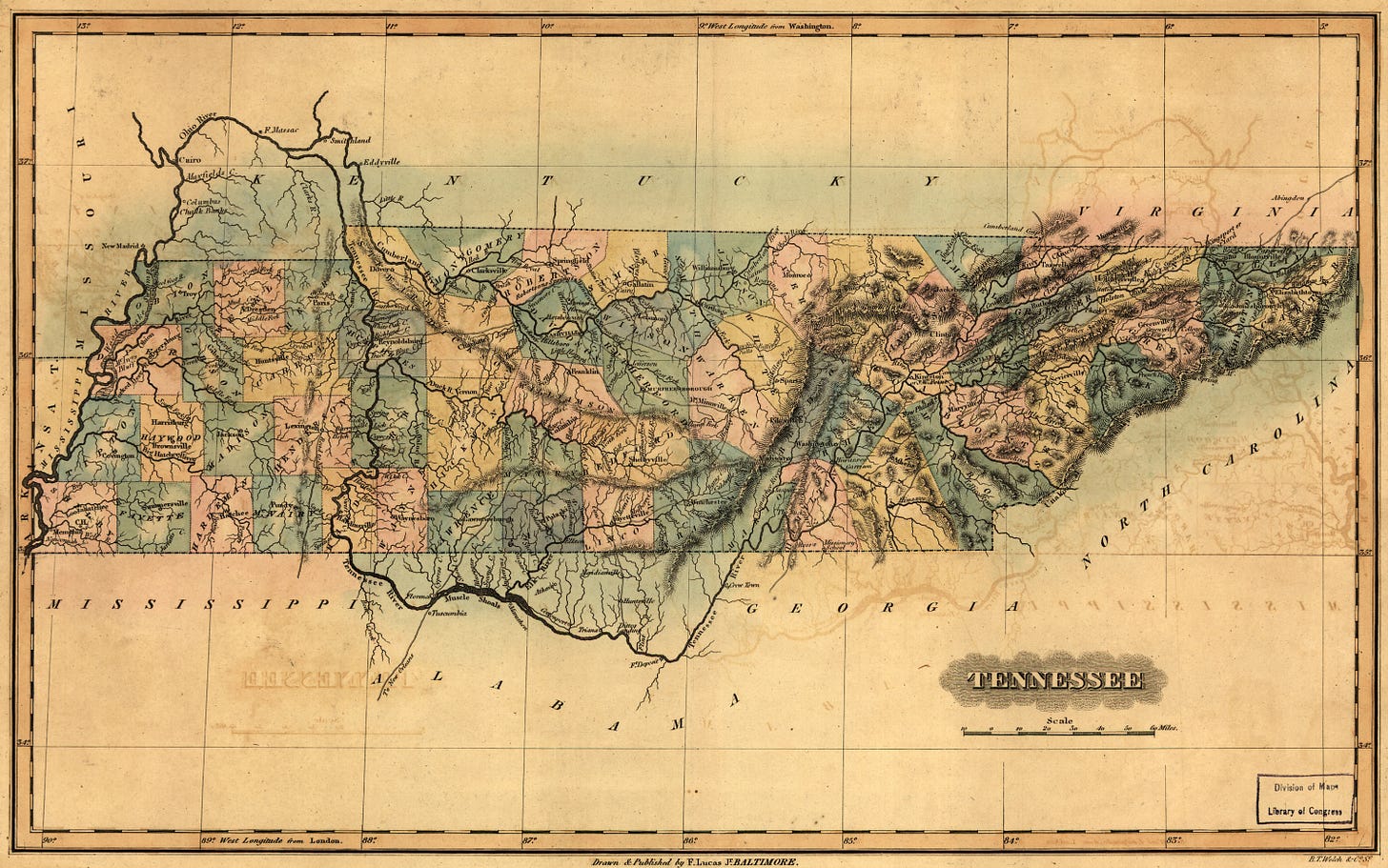
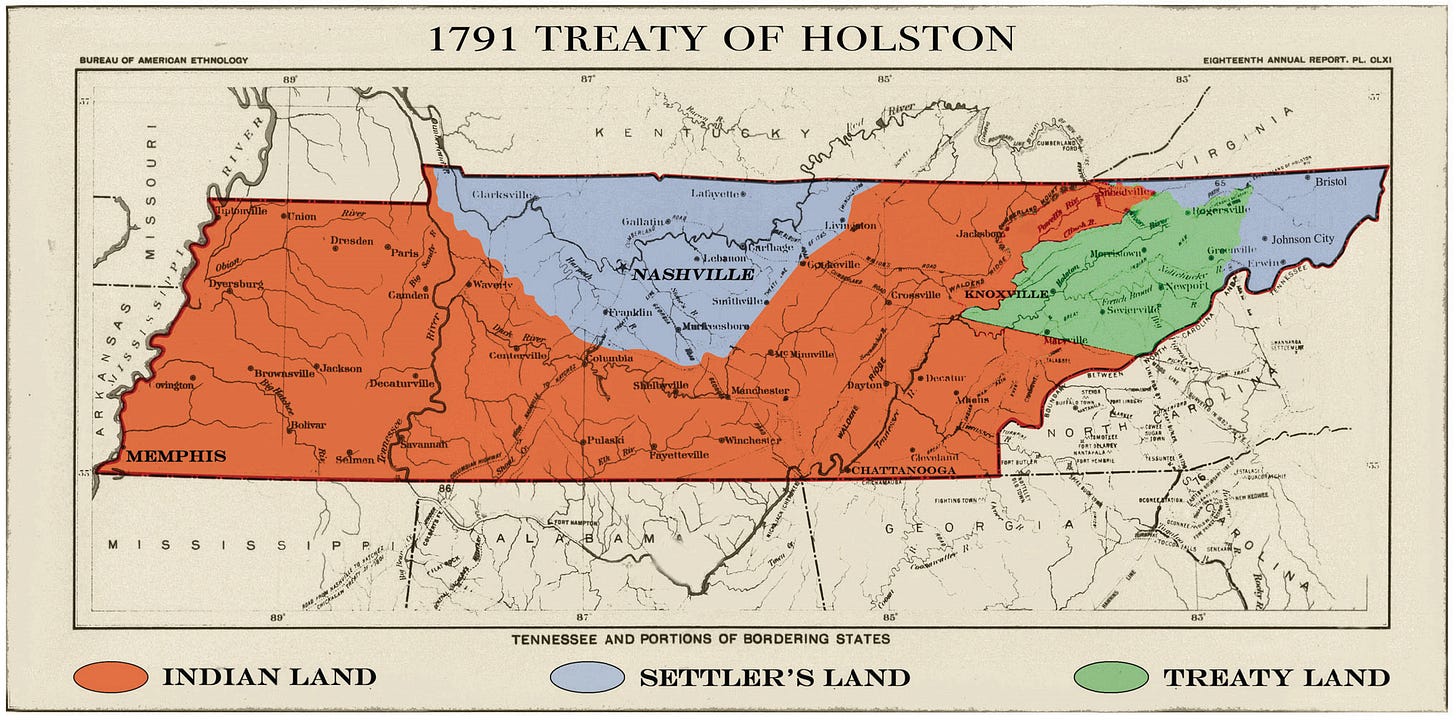
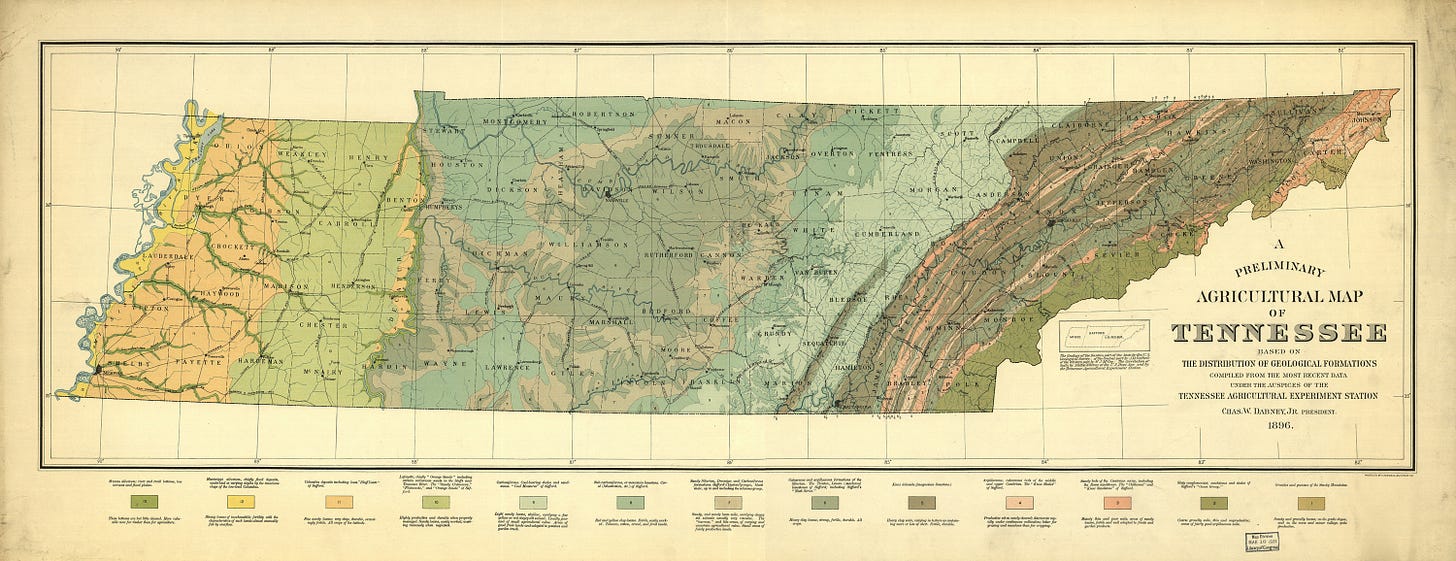
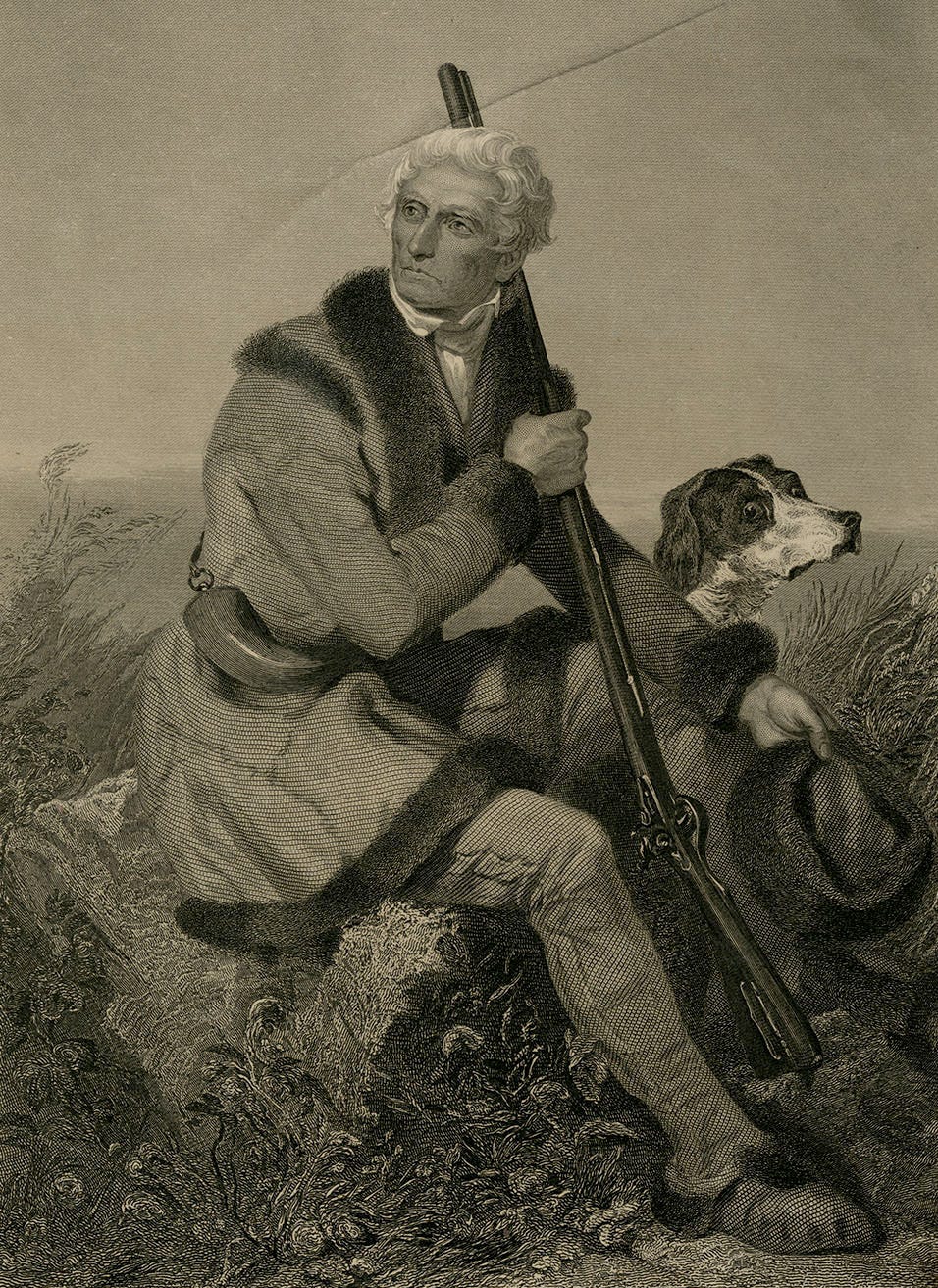
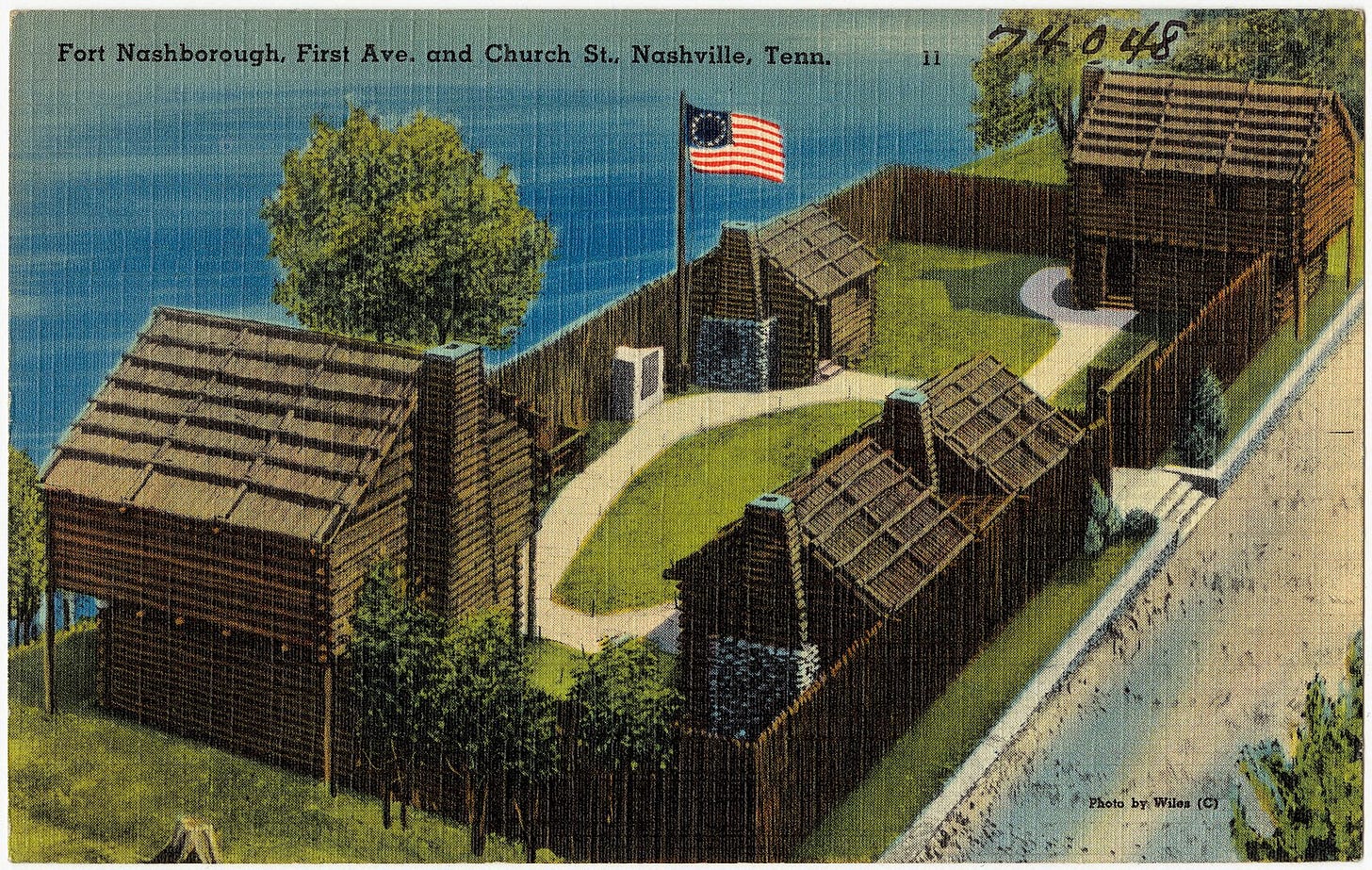
https://hmartinsgazette.substack.com/p/tennessee-history-installment-one
Hi! I digitized Haywood's Christian Advocate for those that wanted to read it but couldn't find it online.